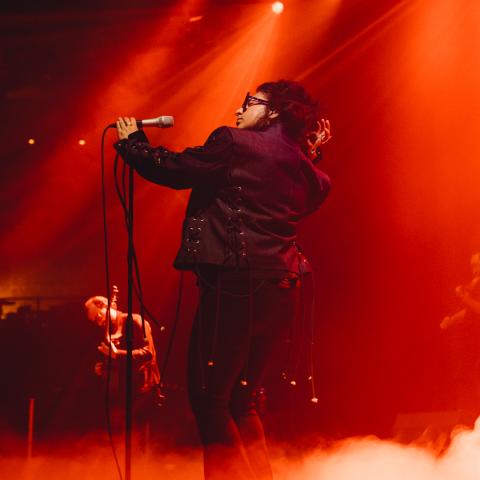The Computer Listens to Georgia Anne Muldrow, and so Should You

Georgia Anne Muldrow performed and spoke at the Gathering, an event series sponsored by the Berklee Institute of Jazz and Gender Justice.
Image by Adam Ridhwan

Muldrow spoke on the freedom and possibility of digital production and MIDI at the Gathering.
Image by Adam Ridhwan

Muldrow recorded with engineer Jaime Sickora B.M. '98 at the Shames Family Recording Stage on campus.
Image by Adam Ridhwan

L.A.-based engineer Jaime Sickora (left) has worked with artists including INXS, Coldplay, Herbie Hancock, Faith Hill, and many more.
Image by Adam Ridhwan
Georgia Anne Muldrow grew up surrounded by music, but it wasn’t until she discovered drum machines and MIDI keyboards that she figured out how to make music that sounded like what she was hearing in her head. During a talk on campus this fall, a part of the Gathering event series sponsored by the Berklee Institute of Jazz and Gender Justice, the genre-defying producer and singer described her journey from undisciplined piano student to studio pioneer.
The daughter of two L.A. music scene veterans (jazz guitarist Ronald Muldrow and vocalist Rickie Byars-Beckwith), Muldrow recalled the parental expectation that she would learn to play an instrument. “Both of my parents were like, ‘oh, you need to be in a piano class or you need to go to drum class,’” she said. "The first day, they put me in the intermediate class, and the next day I was gone…I was like, ‘Nah, I don’t got time for this.’” She remembers not being interested in the music on the page, but instead watching her piano teacher’s hands as she played: “I was looking at her hands because the part that appealed to me most was her feel…you can’t learn that—you have that.”
“Tell you what: get a MIDI controller and you feel like you can play anything.”
—Georgia Anne Muldrow
It took a little while for her parents to accept that Muldrow’s approach to music was different, but no less passionate, than their own. But once she found her way into electronic production, they supported her: “When I got in touch with something that could record an idea I had, I was like, ‘Oh snap, I’m gonna make a song!’ First it was the drum machine…and then the keyboard, and I was like, 'Mom, can I have one?' and to quote the great E-40, my mom 'had my back like a masseuse.'"
From there, Muldrow said she discovered MIDI, and fell in love with the possibilities that computer production opens for creating and shaping any sound she could want to hear. “Tell you what: get a MIDI controller and you feel like you can play anything,” she said. “It’s a beautiful thing—the computer: it listens—to be listened to, and not to feel invisible anymore.”
Listen to Georgia Anne Muldrow's 2018 single "Overload":
Into the Studio
The day following her talk at the Gathering, Muldrow was joined in the Shames Family Recording Stage by a band of Jazz and Gender Justice students for a studio demo, during which Berklee music production and engineering students had the chance to observe Muldrow’s production process, from raw idea to fresh beat.
The session began with a lengthy live jam that flowed seamlessly out of the band’s rehearsal, with Muldrow directing the dub-style groove, playing conga, and singing. Behind the board that day was visiting engineer and Berklee alumna Jaime Sickora B.M. ‘98, whose discography includes recordings by artists from INXS and Coldplay to Faith Hill and Herbie Hancock. While Sickora worked with student engineers to capture the performance, she noted how Muldrow’s enthusiastic positivity affected the whole session's energy: “Georgia puts me in a good mood!”
Once the initial jam was tracked, Muldrow came into the control room and got to work with Sickora and student engineers, shaping the raw tracks into an arrangement by a process of subtraction. She would direct the engineers to mute whole swaths of tracks and pull out specific passages, highlighting particular moments in the performance and refining the sound one instrument at a time. She compared her process to sculpting—you start with a mass of material, and then, “you’ve just got to start hitting the rock, hacking away big pieces to see what’s there.”
By the end of the session, Muldrow had brought her computer and sampler—her hammer and chisel—into the control room, and she was adding layers of electronic augmentation and vocal tracks to a ten-second loop she had pulled out of the twenty-minute recording. And what had begun that morning as a loose series of improvisations was now a sharply sculpted and polished musical moment.




